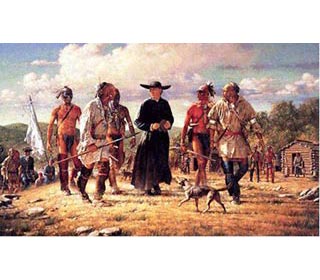The war is named after the new Protestant English King William III who opposes France. King William's War was the North American extension of the War of the Grand Alliance in Europe. The English, led by Sir William Phips, captured Port Royal, Acadia (later Nova Scotia), but failed to take Quebec. The French and the Indians under the Count de Frontenac carried out successful attacks on Salmon Falls (in present New Hampshire), and Casco Bay (in present Maine) but failed against their main target, Boston. The Treaty of Ryswick which was ratified on January 7, 1699 ends King William's War, but the result was indecisive. The peace does not hold for long, hence the succession of conflicts known as the French and Indian Wars. The next war to erupt is the Queen Anne's War (1702-1713). Fast Facts about the King William's War
Who fought in the King William's War? When did the conflict start and when did the conflict end? What were the causes of the King William's War? What was the significance of the King William's War? What were the results and effects of the King William's War? Interesting history and facts about the King William's War: - Name of Conflict: King William's War
- Alternative Names for King William's War: French and Indian Wars, the Nine Years War
- Location of King William's War: Northern English colonies of present day Maine, New Hampshire, Vermont, Massachusetts, Rhode Island, Connecticut, New York, and New Jersey
- Year King William's War started: 1688
- Year King William's War ended: 1699
- Combatants in King William's War: The French and their Indian allies. The Wabanaki Confederacy was between five Algonquian speaking people consisting of the Abenaki, Mícmac, Penobscot, Passamaquoddy and Maliseet tribes. Other tribes were also involved including the Lenape, Ojibwa, Ottawa, Shawnee and Wyandot
- Combatants in King William's War: The British and their Indian allies. The Iroquois Confederacy was between an alliance of tribes headed by the Onondaga, Cayuga, Mohawk, Seneca and the Oneida tribe. The Cherokee and Catawba tribes also fought for the English
- Result of King William's War: The Treaty of Ryswick ended King William's War, but the result was indecisive hence the succession of conflicts known as the French and Indian Wars
- Famous Leaders in King William's War: Sir William Phips for Great Britain and the Count de Frontenac, who was the governor of New France
Specific Causes of the King William's War
What were the specific causes of the King William's War? The specific causes of the King William's War at a local level were: The Iroquois League wanted to extend their territory needing access to stocks of beaver enabling them to to monopolize the fur trade and trade for arms and goods with the Europeans The French and English wanted dominance in North America and to monopolize the highly lucrative fur trade from a European perspective
History Timeline of the King William's War
This short History Timeline of the King William's War provides fast facts and information about the history, years & dates, key events and famous people who fought in the King William's War. For additional Facts and info refer to the French in America. - 1640: 1640 - 1701 - The Beaver Wars, also known as the Iroquois Wars or the French and Iroquois Wars
- 1688: 1688 - 1763 The French and Indian Wars begin between France and Great Britain for lands in North America. The Iroquois Indians were allied to the British and the Algonquian speaking tribes were allied to the French.
- 1688: (1688-1699) King William's War (part of the French and Indian Wars) between France and the Wabanaki Confederacy and England and the Iroquois Confederacy.
- 1689: Feb 13, 1689 The Glorious Revolution. The Protestant William III and Mary II officially replace the Catholic James II as monarchs of England. The English Bill of Rights enables Parliament to control laws and taxes in Colonial America
- 1689: July, 1689 The French governor of Canada, Count de Frontenac, incites a large force of Abenaki and Pennacook Indians under the command of Kancamagus and Mesandowit to raid Dover, New Hampshire
- 1689: June 1689, a large force of Abenaki and Pennacook Indians under the command of Kancamagus and Mesandowit raided Dover, New Hampshire, killing more than 20 and taking 29 captives, who were sold into captivity in New France.
- 1689: August 1689, The French led an Abenaki war party to raid Pemaquid in Maine.
- 1689:August 1689, 1,500 Iroquois attack the French settlement at Lachine in southwestern Quebec
- 1690: Count de Frontenac attacks the Iroquois village of Onondaga. France and its Indian allies then attack English frontier settlements, most notably the Schenectady Massacre of 1690 during King William's War
- 1690: The Battle of Port Royal led by Sir William Phips began on May 9, 1690 in which the French are defeated
- 1690: Phips was defeated in the Battle of Quebec
- 1692: 1692 - the Candlemas Massacre, the Raid on York: The French led 150 Abenaki in the attack and over 100 English settlers were killed in York, Maine
- 1696: The Siege of Pemaquid in Maine
- 1696: The English retaliated and carried out a raid against Acadian communities
- 1699: Peace Treaty called the Treaty of Rijswijk was made at Pemaquid. August 11,1693. and was ratified on January 7,1699 ending the King William's War
Significance & Effects of the King William's War
The effects and significance of the King William's War in history is that the indecisive result of the war lead to continuing conflicts between the French and English interests in North America. The Hudson's Bay Company had established trading outposts and these were subject to attacks by French raiders. King William's War ended in 1699 but it was swiftly followed by the outbreak of Queen Anne's War in 1702. |
